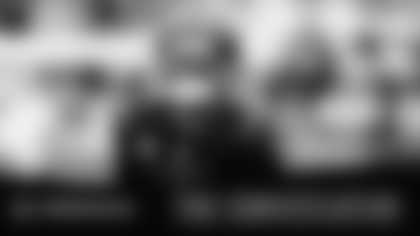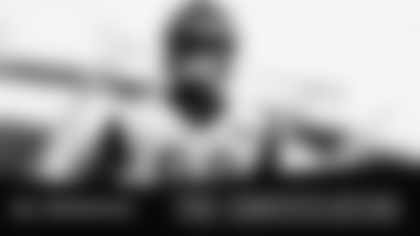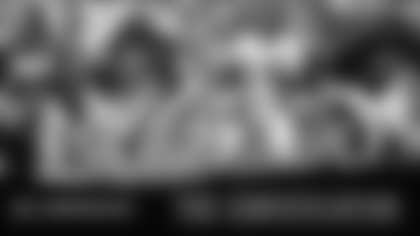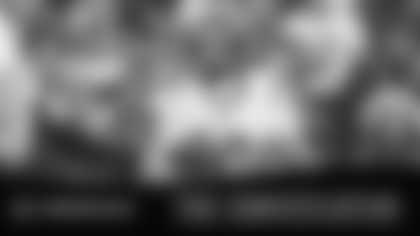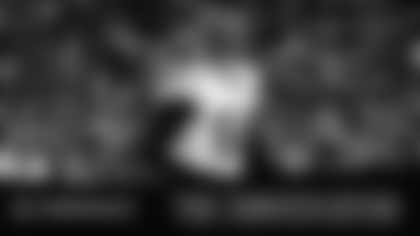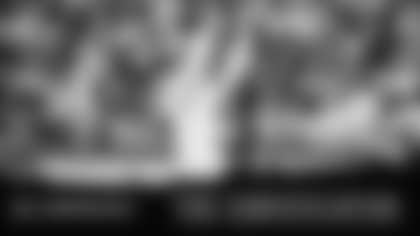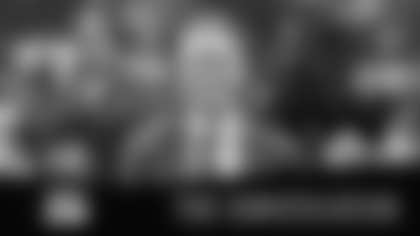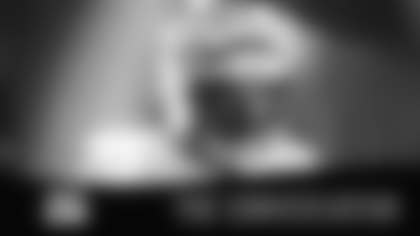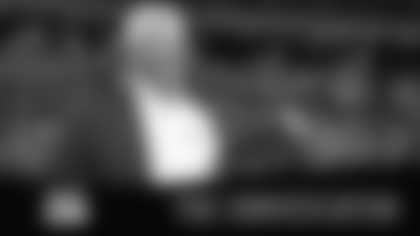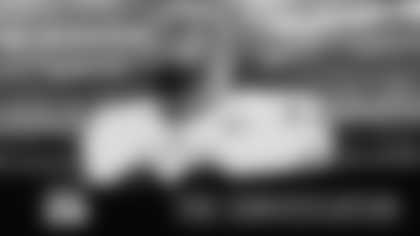Cincinnati author Bill Koch and Bengals.com senior writer Geoff Hobson, who worked together briefly as sportswriters for The Cincinnati Post of the early 1990s, reunite for The Conversation about Koch's new book Unfinished Painting on the mysterious legend of the late Bengals quarterback Greg Cook.
Or, as Bengaldom knows Cook today, Joe Burrow before Joe Burrow.
A homegrown product of Chillicothe, Ohio, and the University of Cincinnati, Cook was the fifth pick of the 1969 draft and the last AFL passing champion and Rookie of the Year before the 1970 merger despite injuring his throwing shoulder early in the season. A brilliant passer with a charismatic game, "The Joe Namath of the Midwest," became a frequent label around here in '69.
Other than three desperate passes in 1973, Cook never played again with a shoulder injury that was never understood like the man himself. An accomplished painter and creative cook, Cook battled alcohol and a nomad existence before dying at age 65 in 2012 and leaving behind as many questions as the What Ifs that surround a career those from Paul Brown to Bil Walsh say would have been one of the greatest of all-time.
No one is better equipped to separate fact from lore than Koch, a native Cincinnatian who worked at both The Post and The Cincinnati Enquirer as a sportswriter across five decades, doing it all as a gifted beat reporter, features writer and columnist.
Best known for his work covering University of Cincinnati sports, Koch also covered the Bengals, Reds and the Olympics, along with other major events, before moving to the UC sports website. He retired a few years ago to write books on a raft of subjects, ranging from Elder High School sports to the life and times of former UC basketball coach Bob Huggins.
The Conversation:
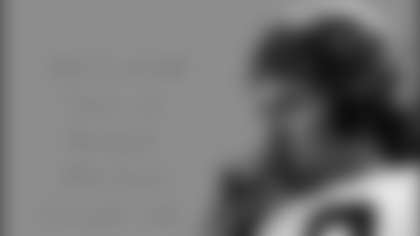
BK: So you transcribe it? It's not a podcast?
GH: No. It's a written conversation. Kind of like a Playboy Magazine interview back in the day.
BK: So you can fix all the dumb things I say?
GH: No, so I can make myself sound better. I've got to tell you that your book is a treasure trove for Bengals fans everywhere. I don't know where to begin, but I'll begin with this. What was your biggest surprise while you were writing the book or since it's been published?
BK: I didn't know that he was close personal friends with Mike Brown, and I didn't know the extent to which Mike Brown still misses him today. You know Mike a lot better than I do, but for Mike to say something like, "He's left a void in my life that was never able to be filled," that's pretty startling to me. That's amazing.
GH: The fact, too, he's got two prints down here in the office that Greg painted. I think it's interesting when he told you the football print reminds him of Greg playing. But I was also struck by what you wrote about a showing Greg had of his works around 1973 of about 200 paintings or so and only one was about sports. A tennis ball.
BK: When I talked to (former Bengals tight end Bob Trumpy), I guess somebody had told Trump that Greg never finished a painting. He never could finish one. Well, that's not true. He finished a lot of them, I'm staring at one right now. A print of the famous … I don't know if it's famous but it's famous to me … He painted a tiger, a tiger head, and it's beautiful. I got it because at (former Bengals public relations director) Jack Brennan's 50th wedding anniversary party in January, this friend of mine, he's a big UC booster, and he was there because Jack knows them from his church.
So he asked me, 'are you writing a book right now?' I told him Greg Cook, and he said, 'well, I've got this print that somebody gave me, but it's too big to hang in my house. Do you want it?' So he brings it to my house the next day. I was thrilled to have it. I'm staring at it right now. It's so beautiful.
He was really talented. And for Mike to have those. I remember when I talked to Mike the first time, and he walked me down from his office to his granddaughter's office and proudly showed me those prints. He's proud to have them.
GH: Mike helped him a lot, too, right? Although typical Mike, so low-key and modest, he didn't tell you how much he helped him.
BK: No, he won't. He steadfastly would not. Some other people have told me that Mike paid his bills for a while. That he lent him money. I had some people wonder why Greg didn't become a coach, and Mike told me they offered him a chance to be not a coach, but a scout or something like that. But Greg wasn't interested, for whatever reason.
And even Mike said at that point in his life he probably didn't have the discipline where he could have done it anyway. But he said Greg would have made a great scout because he knew what a great quarterback was. He knew what to look for in a great quarterback, but for whatever reason, he didn't.
GH: There are so many, so many unknowns like that about Greg. Why wouldn't he let people help him?
BK: Like his son said, it was just pride. I don't know, it might have been something more than that.
GH: From what the people you talk to say, how great of a player was Greg Cook?
BK: People who played with him just rave about him. At UC and with the Bengals. Not only just his physical talents, but he had that magnetism that makes people follow players, makes other players follow. And he was a physical specimen. He had that personality and that magnetism. He had that powerful arm. One of the stories I read in the newspapers said he could throw a ball 90 yards in the air. Even after he got hurt, Mike Brown said he could still throw it 50 to 55 yards, "which is still further than our other guys could."
He had a way about him that he could even mess with Paul Brown. He would kid Paul Brown about the way he dressed. Paul Brown was famous for his messenger guard. Sending in plays with the guards. Trumpy said Greg just did what he wanted to do. They'd send in a play, and Trumpy said, "Greg would turn to me and say, 'Trump, go down. Get open. I'm coming to you.'" That was the play. He just kind of transcended what was old-time football, and he played the game the way he wanted to, and it worked.
Like Mike Brown said. He compared him to Joe Burrow. He said Joe Burrow does it through talent, yeah, but also through intense preparation. He knows everything is going to happen, and then he adjusts, and he makes the right play. With Greg, it just happened. That's probably the difference right there.
GH: Cook was Burrow before Burrow.
BK: Absolutely. They both got hurt early in their careers, but Burrow was fortunate enough that it wasn't a career-ending injury, and Cook's wouldn't have been either if the medical technology would have been more advanced at the time.
GH: You make a lot of comparisons to Burrow. I call them Route 32 cousins with Cook from Chillicothe and Burrow from Athens. The only Ohio-bred quarterbacks for Paul Brown's team. Did Burrow kind of spur the book in a way?
BK: I wish I had a better story for this because people always ask me what made you write this book? Part of it was I grew up here. I remember Greg Cook, but that's not enough to make me want to write this book, because I've heard that in the back of my mind my whole life.
When I finished the Bob Huggins book (Huggs), I thought I can do a book on the greatest athletes in UC history. Kind of like (former Cincinnati Post sports columnist) Joe Posnanski's 100 best baseball players of all-time. I was well-positioned to do that because I covered them for so long.
So I literally started making a list of who would be on that list of the greatest players. Oscar Robertson and Jack Twyman going down. Kenyon Martin. The Kelce brothers. Greg Cook pops up in my mind and I said, 'Greg Cook has to be on that list.' Then I paused for a second. I knew a little bit about what I had heard happened to him, and I thought to myself, that would make a good book in itself. The more I thought about it, I thought it really would make a good book. So I asked people what they thought of the idea. And the one guy who really spurred me on to write it was Dennis Janson.
And I went and had lunch with him. I told him what I was going to do, or I was thinking about doing it. He was just over the top, enthusiastic about it, and he helped me so much along the way. I couldn't have written the book without him. So that's why I decided to do it. It was just like a weird thing. I started making this list, and Greg's name popped up, and I thought that would be a great book. That's it.
GH: When you talk to Dennis Janson, the former long-time Channel 9 anchor, you're stepping into the vault of Cincinnati sports history. No one was or still is connected like DJ is.
BK: He knows everybody. I wasn't surprised that he was friends with Greg Cook. I'm not sure Mike Reid would have given me those great quotes if Dennis Janson hadn't reached out to him and said, talk to this guy. I didn't know Mike Reid.
GH: That's how you ended up talking to Mike?
BK: That's how I ended up talking to Mike, that's how I ended up talking to Trumpy. A lot of those guys. Dennis Janson paved the way for me. I couldn't have written about it in the detail that I did (without) Trumpy. Whenever I needed to fill out a chapter or get more information, I would just call Trumpy. He'd always call me right back. He was such a great source.
I remember the day or two days after I met him at Mount Adams Bar and Grill for the first time, and he too was very enthusiastic. And he said, "If you want, I can take you to a couple of places where Greg lived."
So he takes me to South Cumminsville, shows me the house which was the last place Greg lived. It's kind of a run-down house down the street from a bar.
The guy who owned the bar also owned the house and said Greg could stay there. I took a picture of it. Trumpy says, "Let's go take a walk in the backyard and see what's back there." And so we start walking back down there. I'm like, "I think people are living here. I don't think they're going to be real thrilled us walking in the backyard.' 'Ah, don't worry about it.' I don't know how well you know Trumpy, but he's very sure of himself.
When I first met with him at the Mount Adams Bar and Grill, I had all these questions I was going to ask him. I never got to any of them. He just started talking and an hour and a half later, I'm like, "Okay, I guess we're done here."
GH: Until your book, not much was known about Greg after he stopped trying to play in the early '70s. How much did you know?
BK: I knew some of the story. Let me put it this way. I grew up in Cincinnati, so I knew about Greg Cook. I was 16 in 1969 when he hit the Bengals, so I knew how great he was during that season. I also knew that he was hurt. I knew that he never played again, except for a couple of plays in 1973.
And I heard stories that he had problems later in life. I didn't know that he was, at times, virtually homeless. He wasn't living on the streets, per se, but he was living with friends for like several weeks at a time, or several months at a time. I didn't know the extent of it. I didn't know that he was an alcoholic. If he was an alcoholic, that's a clinical designation that I don't know if he was, but he had a drinking problem. But he didn't drink at all when he was younger, according to everybody I talked to. So I didn't know all the details of it.
GH: I thought one of the more interesting things in the book was the couple of vignettes at the end about Trumpy's career as a broadcaster and Mike Brown's brief stint as a coach. But I think the great treasure you unearth is Mike Reid. Reid is 75 and almost a mythical figure himself. Still maybe their greatest defensive lineman who retired so suddenly after five seasons and became maybe an even better songwriter in Nashville.
He talked about that and Greg so openly and well. You talked to him more than once, right? And he ended up giving you the title for the book.
BK: Yeah, he did. I think I wrote this in the book. When I finished talking to him on the phone, I think I talked to him the first time for about 45 minutes, and I hung up the phone and I went downstairs to my wife and I said, 'I've been talking to athletes for 40 some years. I've never had an interview like that with an athlete.' He was just amazing. Intelligent, insightful. He recommended books for me to read.
I really think that's some of the best stuff in the book. I mean there's a point in that book where I string together four or five Mike Reid quotes because I couldn't say it any better than he was saying it. I couldn't come close to saying it as well as he was saying it.
GH: It's a book not just about Greg, but some real good stuff about the early Bengals. Paul Brown didn't resent Mike Reid for retiring. He was the kind of player Paul Brown had in mind.
BK: Yeah, the old thing he used to say about it's time for him to get on with his life's work, not just (Reid). But all his players. At some point they have to get on with their life's work. Mike did that. Maybe a little earlier than they would have hoped, but that's what he was doing. And he was never upset that Mike left.
GH: And, I didn't know this. Greg Cook was the best man at Bill Bergey's wedding.
BK: Yeah, a little town in Arkansas.
GH: I mean, who knew that? Great anecdote. How did you find that?
BK: Greg's son, Brandon, was happy that someone was writing a book about his dad. But he was very worried about what I was going to write. And in one of my conversations with him, he asked me if I had talked to Bill Bergy, and I said no. He said, 'Well, you should talk to him because he really liked my dad, and they were really close.'
So I made sure I talked to Bill Bergey. I didn't want Greg's son to think that I was out to do a hatchet job on him or rip him. If he suggested I talked to somebody, I wanted to make sure I talked to him. And Bergey told me about the wedding story.
GH: Did you ever think about putting a rough draft for approval in front of Brandon, or you wouldn't do that?
BK: He asked me if I would do that, and I said no.
GH: Why?
BK: As hard-bitten journalists, we're always taught not to do that. Because he did. He asked me several times, 'Do you think I could read this before it gets published?' And I said, 'Brandon, I just can't do that.'
I did have a guy in Chillicothe who helped me. He helped put me in touch with people that Greg went to high school with. Really nice guy. We became friends. I let him read it. I let him read the first chapter about Chillicothe just to make sure it was accurate. But no one else read anything ahead of time.
GH: Have you talked to Brandon since? Has he read the book?
BK: He has. I sent him a copy. And then a few days later, he called me, and when I saw who it was, I thought, 'Oh-oh, something's wrong. He didn't like the way I treated his dad or something.' But we talked for like a half-hour and he was just bubbly that I had sent him this book and I had signed it. At this point, he had just gone through and looked at some of the pictures, and he was real happy with it.
But then I never heard from him again for several weeks. I knew he hadn't read it at the time yet. Just last week, he sent me a text message that said he loved the book. I was relieved to hear that. Not that I was writing it to please him, but you know me well enough. I'm not out to rip anybody just for the sake of ripping him or to sell books. I wanted it to be accurate and he said, "It's the first time I've ever read a book where I knew the ending. I knew how it turned out."
GH: You probably wish you would have met Greg.
BK: I did meet him.
GH: Tell me about that.
BK: I don't remember much from it. He did color commentary on UC radio broadcasts for maybe two years. Late 80s, early 90s. And I remember being on a UC football road trip. I don't remember where it was. I remember Gresh (Enquirer reporter Tom Groeschen) was there, I was there. And I think Tim Moreland was the play-by-play guy, and I think for some reason, somehow, we all ended up going to dinner together. And Greg was in that dinner.
I just remember I thought, 'Wow, that's Greg Cook.' I thought it was pretty cool that I was having dinner with Greg Cook. I don't remember any specifics from it, except that he just seemed different. I don't have a better way to say it. Not in a bad way. Just different.
GH: You talk about this a little bit, but I don't think you really come down on it either way. Do you think Greg was bitter about how his career ended?
BK: This was his son, Brandon telling me this. He grew a little more bitter later in his post-football career, and he wondered why. He realized then he probably shouldn't have been playing, but I think at the time he wanted to play. He didn't know that he had this serious injury. When he first got hurt, it was diagnosed as a strained muscle and he was just told to rest for a few months, and then lift some weights and strengthen it, and he'll be fine.
So he thought the whole time that he would be and then he goes to the training camp, and he can't throw. If he had feelings like that, I think they came later. I don't think it was right away when it was happening.
GH: You really dive into the medical stuff like no one has before. My sense is Paul and Mike thought they were doing the best things for him. It's just the technology wasn't there yet.
BK: Remember, they had just come from Cleveland, and the Cleveland Clinic to them was the pinnacle of medical science, and they had a guy there who was, as UC's orthopedic surgeon told me, was known as the Father of Sports Medicine.
You would think, why does the same guy keep operating on him when the results are never any good? Because they thought he was the ultimate guy, and they were willing to trust that he would figure it out. Well, obviously he never did.
GH: Greg was a fascinating guy. I think I could only get him once for a story. He was very kind to me. It was about two or three weeks into Blakemania in 1994 and he was great talking about Cincinnati embracing athletes. Obviously, a really good painter. And he could cook. I didn't know that until I read the book. A great baker. The guy was a Renaissance man.
BK: There's that story how Kroger wanted to carry his cheesecake. So there's a woman I talked to for the book. It was Greg's girlfriend. Live-in girlfriend for four or five years. Again, Dennis Janson put me on to her and I talked to her for a long time, and she's telling me pretty good stuff about Greg, and eventually they broke up. But then I called her back to check on the spelling of her name, and she said she didn't want her name in the book.
I said, well, why did you talk to me? I told you I was writing a book. She goes, oh, I just did it as a favor for Denny. And I said, Well, you didn't think I was going to use any of it? She goes, I just thought you could use it as background. Journalistically, I would have been within my rights to use it anyway. I identified myself up front. She knew what she was doing, but she's in her late 70s. She was very upset. I used a couple of things without her name, but I mentioned that cheesecake recipe to her. She said, 'Oh, he stole that recipe from me.'
GH: I mean, it seemed like at any point in his post-playing career, he could have been a great local artist, right? He would have been a John Ruthven. Or he could have been like a Kroger gourmet or something.
BK: That's the sad thing. He had these other talents, especially the art talent, but it wasn't enough to compensate for the hole in his life that football left. It just didn't do it for him.
GH: When I was doing my book, This Day in Bengals History, I realized when you look at the archives down here about this team, this team was well covered by great writers, great reporters. They were all over it. I mean, Marty Williams up in Dayton is talking to Greg on the phone in the hospital the day after his surgery. Greg's always talking. Every move of his Bengals career was documented.
BK: I was really struck by how accessible he was. He would like come back to training camp for the first time and couldn't throw, and he would walk off the field dejected and go in the locker room, and he knew those guys would be waiting for him. He wouldn't blow them off. He came out and talked to him.
Barry Cobb, my old friend from The Post. That was fun reading his old stories. He was a pretty good reporter and writer. I knew him as an assistant sports editor who always came in early in the morning and left right on time at three o'clock in the afternoon.
GH: He'd be whistling with the final edition under his arm. Really good guy.
BK: Lou Smith of The Enquirer would do this sound off column, where fans would write in questions and one Sunday a couple of fans were ripping Greg for his long hair and calling him a hippie. And one them said, 'Why can't he be more like that Pete Rose for the Reds? He's got a nice crewcut.'
So Barry Cobb, even though this column appeared in the other paper, he takes it over to Greg the next day and says, What do you think about this? And Greg just fires on these guys.
GH: Good for Barry. Got a scoop.
BK: I thought that was really strong. It was cool paging through the big old books with all those articles (in the Bengals archives). It was such a throwback thing. Nothing was digitized. P.J. (Bengals public relations director P.J. Combs) just said, 'Clunk, here's a book. Be careful when you turn the pages that the articles don't fall off.' It had been so long since anybody looked at them. You're probably the last one that looked.
GH: This is going on a half-hour. That's a half-hour you can never get back.
BK: You have to transcribe all this crap. That's the problem.
GH: Yeah, that's exactly right. That's why we're about to call this off, Chief. What's your favorite part of the book?
BK: One of the favorites is talking to Mike Reid. It was so fantastic. I remember going to see Mike when he began his music career. There was a little bar up near UC on Calhoun Street called The Family Owl. I went in there with a friend of mine and he just blew me away. So talented. I guess just talking to him. I knew how creative he was and how successful he had been. I was a little nervous talking to him. But he was like the nicest guy. I could have talked to him for another two hours.
GH: I feel the same way. But I have to transcribe and tap. Where can people get the book?
BK: Joseph-Beth and Amazon.




